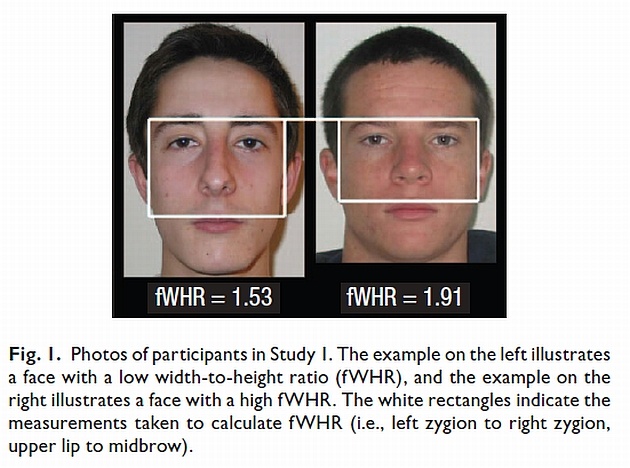Ironically, a Man’s Face Can Tell You If He’s Likely to Act Racist
Austin Considine, Motherboard, February 20, 2013
What can we tell about a person from his or her face? Quite a bit, it seems. Psychological experiments since the turn of the millennium have indicated we do a good job judging people’s sexual orientation, reproductive fitness, criminal proclivities, and even whether they’re Mormon or not, all based on their faces. A new study suggests there’s another trait we can add to the list: a man’s willingness to express racist beliefs.
There’s an obvious irony to a study that says we can tell if a man will act bigoted based on the shape of his face. But the logic underpinning the study, conducted by researchers at the University of Delaware and soon to be published in the journal Psychological Science, is a circuitous and unexpected one, and makes a persuasive case.
Turns out it’s all about the testosterone.
Recent research indicates that men with high levels of testosterone have certain facial characteristics that set them apart from men with less testosterone. In particular, they have what researchers call a higher facial Width-to-Height Ratio (fWHR) which compares the distance between cheekbones to the distance between the upper lip and midbrow. Men with a higher ratio have faces that appear a bit wider horizontally and bit compressed vertically (see below). {snip}
{snip}
Not all men’s faces change equally because not all men have the same levels of testosterone. And here’s the other thing past research suggests about men with high testosterone: They want to dominate. What’s more, we don’t want to stand in their way because, for starters, we probably find men with high fWHRs more physically imposing.
As it’s written the study:
… it may be more accurate to say that testosterone promotes the search for and maintenance of social dominance. Therefore, to the extent that a greater fWHR is associated with increased testosterone, fWHR may be a physical manifestation of dominance motives in males and may be best described as an inclination toward interpersonal social dominance and related behaviors [embedded references removed].
Among the ways men exercise dominant behavior is by breaking society’s rules. {snip} And we, in turn, assume they’ll break them. Whether we know it or not, we know which men will break the rules because we know by the shapes of their faces which ones have more testosterone.
In the world outside your local Tea Party Rally, of course, society says it’s bad to openly express racist opinions. So the Delaware researchers, led by psychology and brain science professor, Eric Hehman (now at Dartmouth), wondered if men with a higher fWHR might feel more comfortable expressing explicitly racist opinions because their high testosterone made them feel less socially inhibited. After gathering and testing 70 white males, researchers found that, relative to the others, they did.
The researchers also wondered if observers looking at photographs of those same 70 men would more often assume the men with wider, shorter faces were more racist. They did. What’s more, their assessments fell right in line with what the 70 men had revealed about themselves: Those men whom the observers believed to be racist were also much more likely to have explicitly expressed racist views.
In the course of several email exchanges, Hehman pointed out that he and his colleagues also tested the 70 men in the study on expressions of “implicit” racial prejudice, which he described as “an automatic association of other races with ‘bad things’” — a kind of unconscious response “that people are less able to control.” When it came to these implicit expressions of prejudice, they had no correlation with a person’s face shape. In that sense, we are bad judges.
The other conclusion to draw is that we don’t have to be testosterone-charged to be racist. Implicit racism, Hehman noted, is just another kind of racism with its own subtle effects. {snip}
{snip}
















